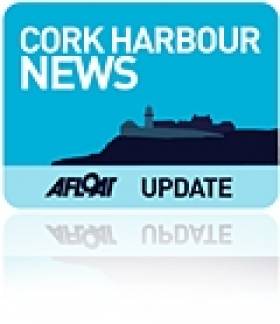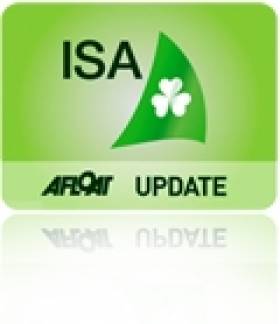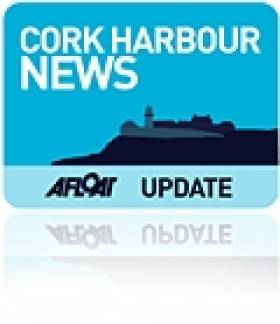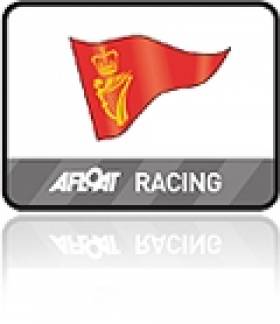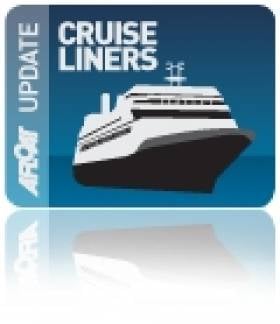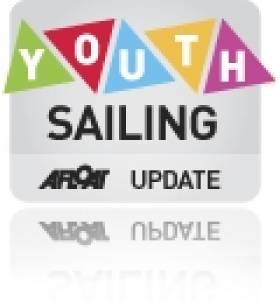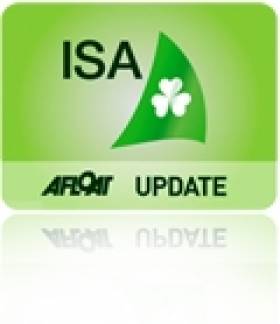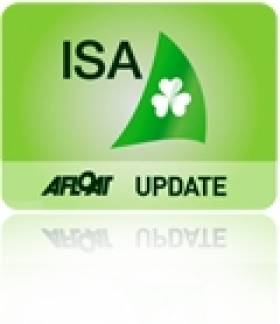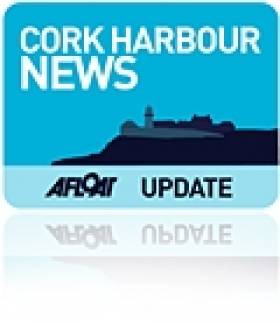Displaying items by tag: Cork Harbour
Cork Harbour Fort Attracts Thousands of Visitors
Thousands of people from all over Ireland visited Fort Camden, Crosshaven during September when the fort, officially named as Fort Meagher, was open to the public for the first time.
The partnership project, which is being spearheaded by Crosshaven Tourism on behalf of the local community association, is being undertaken by Fas workers with funding from Cork County Council and the active support of Rescue Camden, local businesses and other volunteers the local community
At a reception to mark the restoration of two of its barrack rooms, County Manager Martin Riordan congratulated everyone involved. 'This is all about action by a small group with lots of energy and commitment to their own locality. There's lot of talk about what could and should be done but right now we need more bodies like Crosshaven Community Association and Tourism'.
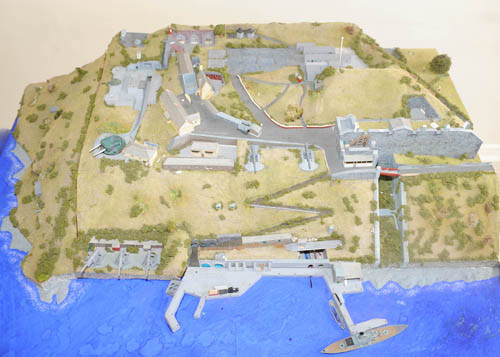
Mr Riordan paid tribute to Fas and praised the staff in the county council who put so much work into the project over many years, including former chief planning officer Brendan Kelleher. He concluded by saying that there had to date, been a tremendous return for a relatively small investment.
Congratulations were also extended by Cllr John A Collins who said it was a landmark day and the start of a bright new beginning for Fort Camden. The fact that on the day he visited during September, he heard so many non-Irish accents confirmed its exciting potential as a military heritage, tourism and arts attraction.
Paul Brierley, chairman of Crosshaven Tourism said the opening of the first two rooms to be restored was a day of celebration. He spoke of the tremendous voluntary ethos and goodwill and believed the project would be 'a template for the county'
He thanked the county manager 'for allowing us a sense of community ownership, his belief in our ability to deliver, his support thus far' and applauded him for 'a shared vision of realizing the tourism potential of Cork Harbour of which there can be no doubt Fort Camden and indeed Crosshaven will have a huge role to play'.
'We have opened the gates to what we feel will be the 'jewel in the crown' of Cork Harbour and Crosshaven, one of the finest remaining classic artillery forts in the world named after one of the most famous men in Ireland, Thomas Francis Meagher', said Paul who urged people to continue supporting the project and visit the website www.rescuecamdenm
Further works are ongoing and it is hoped to again re-open to the public Fort Camden on a temporary basis in March.
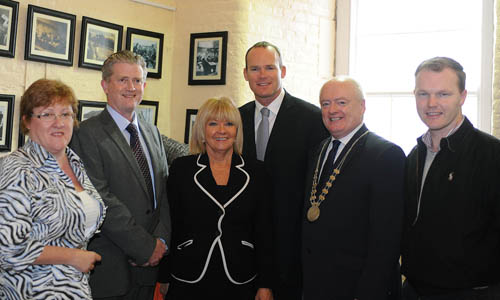
Pictured at the reception (from left) Cllr Paula Desmond, County Manager Martin Riordan, Cllr Deirdre Forde, Simon Coveney TD, Deputy Mayor of County Cork Cllr John A Collins and Cllr Seamus McGrath.
New Pay to Race series to Stop in Cork, Galway and Derry
A new pay to race series around our shores with stop offs in Cork, Galway, Derry has been confirmed. The Round Britain and Ireland Challenge gets underway next year and no experience is needed pre race by the crews as a large amount of training is offered; the crews usually include a mixture of ability and experience and all the yachts are skippered by a Royal Yachting Association Yachtmaster qualified individuals.
With stop offs in a variety of ports this event should offer something for everyone interested in seeing Britain and Ireland from a new perspective whilst racing in a fleet of fantastic yachts.
The races which will start from spring 2011 are using a fleet of six bespoke brand new Dehler Varianta 44’s which are in build in Griefswald at the Hanse/Dehler yard right now. The training weekends and each race start and end in Weymouth bay, the home of the sailing events of the 2012 Olympics, with stop offs from Cork, Galway, Londonderry, Inverkip, Stornoway, Leith, Hull, London, and Cowes.
The series offers sailors of all experience levels the chance to either undertake a single leg from £600, or the whole 28 day race from £4,750 per person. Included in this price are two training weekends with around 300 sea miles, sea survival training, all port fees and food whilst at sea, Gill OS2 offshore foul weather gear, and a post race awards dinner. For more information please contact the race organisers at [email protected], or call 01305 775935 / 08456 434603.
ISA Seek New Date for All Ireland Event
Following the abandonment of the All Ireland Sailing Championships at Royal Cork last weekend due to lack of wind the Irish Sailing Association (ISA) has yet to announce dates for the rescheduled event. An autumn date to accomodate all concerned is the objective, the association said yesterday. The eight finalists involved are; Anthony O'Leary, Neil Kenefick, Nicholas O'Leary, Garrett May, Niall Henry, James Espey, Nick Walsh and Ewen Barry.
'Unauthorised' Harbour Moorings to be Removed
The Port of Cork intends to remove all unauthorised or illegibly marked moorings in Cork harbour this winter and has written to harbour users about the removal which will start next month.
The Port Company recently completed a detailed survey of all moorings within Cork Harbour. A number of unauthorised and illegibly marked moorings have been identified in the course of the survey. The Port says it is the responsibility of the mooring holder to ensure that their mooring is in the correct position and is clearly marked at all times with the correct mooring number. All unauthorised or illegibly marked moorings will be removed over the coming months commencing on the 1st day of November 2010.
The Port has asked Royal Cork Yacht Club to bring the matter, affecting all harbour users, to the attention of its members according to a post on the club website.
The post also says that all boats are requested to obey the speed limits in various parts of the harbour, particularly on their way to the new pontoon in the city. Boats travelling at excessive speed make life very difficult for other harbour users, particularly the members of the rowing clubs on the river.
1720s Ready for Cork Harbour October Contest
Ten 1720s will contest Sunday's first race of Royal Cork's October league in force. The 2010 league marks the return of these sports boat to Cork Harbour but it comes at the expense of the club's three Commodore's cup boats originally planning to take part.
At least two 1720s are entered by the O'Leary family which almost certainly means the Ker 39 Antix will stay on its berth. Peter O'Flynn from Baltimore is sailing and other 1720 entries have been received from Tom Durcan and Denis Murphy.
Following the successful Commodore's Cup campaign Marinerscove is now in the UK and Andrew Creighton has indicated the small boat Roxy will not be sailing.
There have been a few tweaks to the format of the league and this year there will be two courses both starting with committee boats.
Competitors from other south coast ports such as Waterford Harbour SC arrived in Crosshaven this week.
Course Zero, One and Two and 1720 designated as Red Fleet while classes three, four, Whitesail One and White sail Two will be designated Green Fleet and the classes will alternate between the courses each weekend.
Prizes will be awarded for first, second and third place in each class and a daily prize giving will take place no later then 17.30 hrs in the RCYC Club House. The final prize giving will take place at the prize giving gala dinner on Saturday, October 30th.
Azura Cruise Liner Docks in Cobh for the First Time
In another first for Cork Harbour the 115,000 ton Azura cruise liner docked in Cobh last Friday.
After her maiden voyage in April, Azura spent summer based in Southampton cruising to the Mediterranean, the Baltic and the Canary Islands. She'll be sailing the Caribbean in winter from Barbados.
She holds 3,100 passengers based on double occupancy (3,574 when all the berths are full).
At 290 metres long and 36 metres wide she looked an impressive sight on the Cobh quayside as our photos show below.
P&O Cruise's Azura is the company's latest cruise liner. Built at the Monfalcone shipyard in Italy, the Azura is one of P&O's largest ships, boasting 14 public decks, 11 restaurants, five boutiques, four pools, two lounges and over 900 private balconies. It also features an outdoor cinema, a first for the company, along with an al fresco spa and single staterooms.
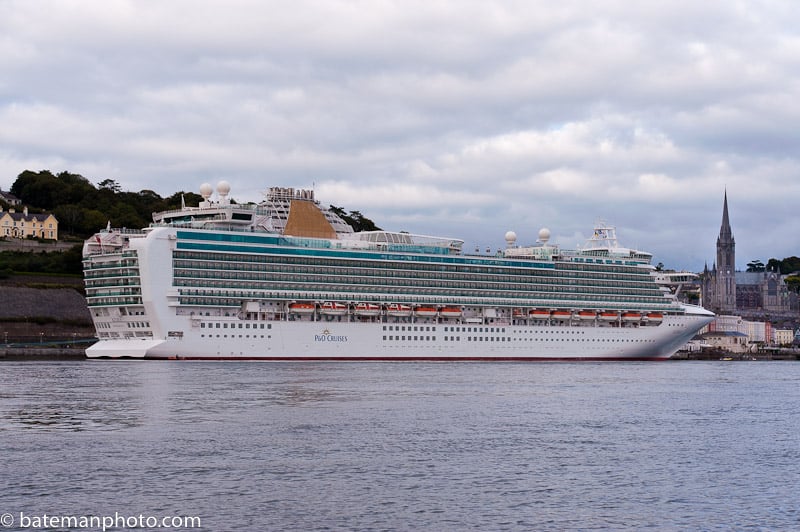
Above and below: two views of the new Azura berthed in Cobh last Friday. Photo: Bob Bateman
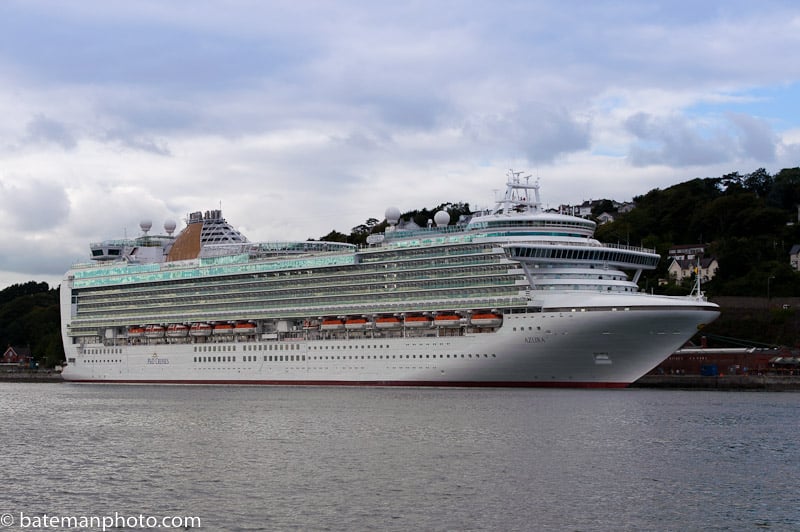
Doran Reigns In Junior All Ireland Event
It was a very long day of sailing in very light conditions for the Juniors on the second and final day of the All Ireland Junior Championship writes Claire Bateman. PRO Richard Leonard raced the fleet on the Curlane Bank in Cork harbour and was very fortunate to be able to get in three races in extremely difficult conditions.
The final result saw Philip Doran of Courtown Harbour SC taking first place with Rory Lynch of of Blessington Sailing Club second and Ross Vaughan of
Royal North of Ireland YC third.
In the Girls Fleet Sophie Murphy of Quoile YC took first place with Emma Geary of RCYC second and Katherine Geoghegan of Dungarvan Harbour SC third.
Photos of the Junior All Ireland Prizegiving and competition by Bob Bateman HERE.
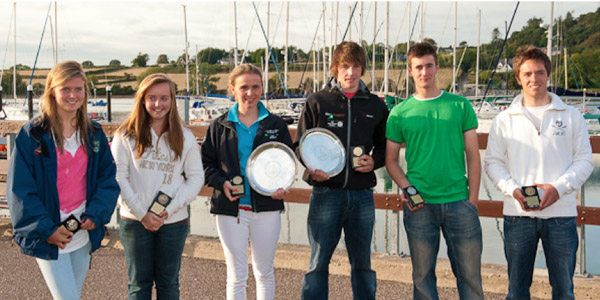
All Ireland Final Date Yet to be Agreed
Eight helmsmen, including the double winner Nicholas O'Leary will be invited to participate in a new final consisting of five races. The eight finallists are
Anthony O'Leary
Neil Kenefick
Nicholas O'Leary
Garrett May
Niall Henry
James Espey
Nick Walsh
Ewen Barry
Forum Discussion HERE
All Ireland Championships Abandoned Due to Lack of Wind
Lack of wind in Cork harbour forced the abandonment of the All Ireland sailing championships this afternoon. Although each flight had been able to sail two rounds since the competition began on Friday the invited class champions had a long wait for wind before Royal Cork organisers scrubbed the event at 4p m today. The Irish Sailing association say the event will be rescheduled. Discussion on the forum HERE.
Spike Island Revisited
It's unclear how Spike Island, now a tourism and heritage site, will be marketed says Mary Morrissy in today's Irish Times HERE



























